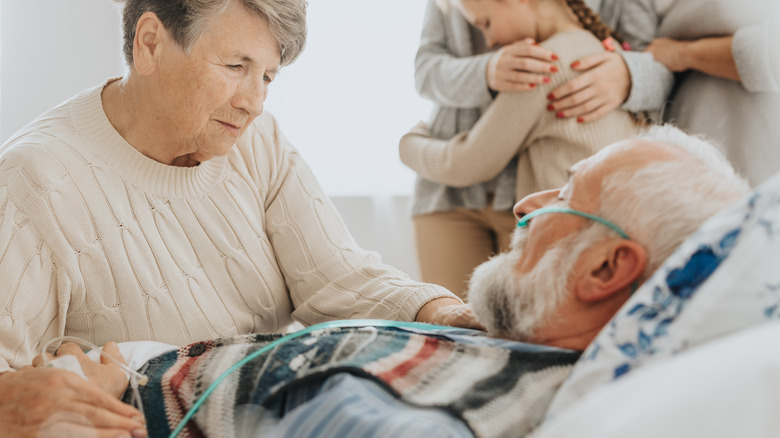Does Someone Know When They're About To Die?
We may receive a commission on purchases made from links.
Death is an uncomfortable topic for most of us but it is also one of the few universal experiences everyone will have. Scientists and doctors have long been investigating what happens to someone as they slowly slip away from this world, and while we don't have all the answers, there are a few physical and behavioral changes you might be able to observe in someone who's dying.
The person's level of activity and movements might decrease significantly, noted the Hospice Foundation of America. They might spend most of their time sleeping. You might also observe that they've detached from what's going on around them — interests, conversations, etc. They may also experience a loss of appetite and mental confusion. Physically speaking, someone who's dying will experience a slowing down of their breathing and a drop in their blood pressure, per Everyday Health. "The fingers may get cold or turn blue. If you feel the pulse, it will be weak, then they start to develop an irregular type of breathing, and that's a sign that things are pretty ominous," added the medical director of the Hebrew Home at Riverdale in New York, Dr. Zachary Palace. A person in the last stages of life may also lose control of their bodily functions like urinating and defecating.
While these are the changes you'll see in someone who's close to death, what about them? Do they know they're dying? According to certified hospice nurse Penny Smith, who goes by the name Hospice Nurse Penny on YouTube, they do, mainly because of what most people say before they die.
Dying people talk of having to 'go away'
Penny Smith, who's passionate about end-of-life advocacy and normalization of death, thinks that people who are close to death sometimes tell us that their time on earth has come to an end. "They might say, in no uncertain terms, 'I'm dying soon,' but often they tell us in metaphors," she added.
They might say things like, "'I need to pack my things,' 'I'm getting ready to leave,' 'I'm going on a trip,' 'I want to go home,' or even just, 'I'm tired,'" shared Smith. For the loved ones who are watching the process, it's a matter of leaning into and listening to what they're saying. By following their cues, you'll really have the chance to say goodbye and express your feelings before they no longer understand, explained the hospice nurse.
People on their deathbeds are often concerned with mending relationships, navigating regrets, and spending time with loved ones. In fact, according to Fellow of the American Academy of Hospice and Palliative Medicine, palliative care physician, and author, Dr. Ira Byock, the words, "Please forgive me," "I forgive you," "Thank you," and "I love you," become even more meaningful when death is near. As a loved one who's close to someone nearing their end, facilitating these important conversations could be the biggest gift you can give them.
Someone near death may feel peace
According to a 2014 study published in Resuscitation, people close to death sense being separated from their bodies and feel peaceful. The research involved interviewing 140 cardiac arrest survivors with near death experiences from the U.S., U.K., and Austria.
Neuroanatomist and author of the book, "My Stroke of Insight," Dr. Jill Bolte Taylor, who experienced a sense of bliss when she had a stroke, per Forbes, thinks her euphoric sensations when close to death may have had to do with what part of your brain dies first. The left brain is often credited with all that's logical, mathematical, and factual in our thinking, while the right brain is where creativity, imagination, and feelings thrive (via Healthline). Dr. Taylor thinks that when we're close to death, it's the right side of our brain that endures.
"When we're on our deathbed, the left brain begins to dissipate. We shift out of all the accumulation and the external world because it's no longer valuable. What is valuable is who we are as human beings and what we did with our lives to help others," she told Forbes. Perhaps this is another explanation as to why someone who is about to die is concerned with mending relationships. Even if we don't have all the answers about what people see and hear before they die, we do know that they want to spend their last moments in peace and love. Maybe this will help us do the best we can to make the experience of their passing meaningful for them.


